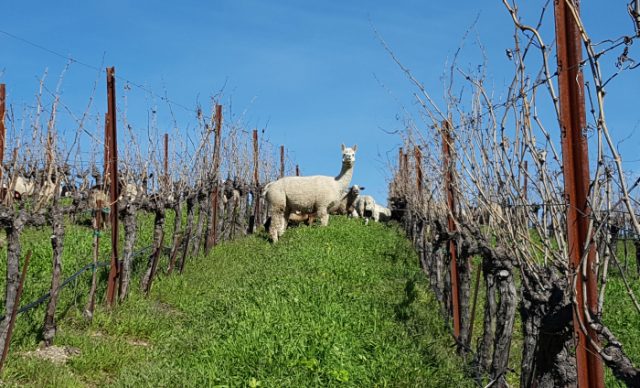How a few changes to vineyard management could help save the planet
There’s a new approach to vineyard management that yields healthier grapes, doesn’t require certification, and could help save the planet.

It’s been dubbed ‘regenerative viticulture’ and it can be practised under any farming regime to improve sub-surface microbial life, root health, and, crucially, capture carbon in large enough quantities to help offset emissions from other activities that consume this valuable element and release it as a ‘greenhouse gas’: CO2.
Justin Howard-Sneyd MW, who, as director of the UK’s Dartington Trust, is running a course on Sustainable and Regenerative Viticulture, told db last month that farming techniques needed to change to sequester more carbon in the soil, both to benefit wine quality and take the element out of the atmosphere, where it’s widely believed to contribute to climate change.
“There is so much farmland planted to vines around the world, we should be looking at ways in which farming can be done to produce great tasting grapes and better look after the environment,” he said.
Central to the idea of regenerative viticulture is increasing the amount of carbon held in the ground by changing soil management practices, according to Howard-Sneyd MW.
“Soils are capable of holding a much higher amount of carbon than they do with conventional farming practices, and that’s because the best way to destroy carbon in the soil is to till it, because as you turn it you expose it to UV light which is an oxidising force, and destroys a lot of the organic matter in the soil,” he explained.
“So if there’s one message [of regenerative viticulture], it’s don’t till your soil, and, by leaving the top 20cm of the soil undisturbed, you can keep the relationship between the Mycorrhizal fungi and the plants, which will also increase the amount of organic matter in the ground, which in turn will capture a lot of carbon,” he continued.
So how should wine producers be managing their vineyards to ensure they have healthy vines without turning the soil to remove any unwanted competitor plants?
There are a number of solutions, from employing mowing machinery to grazing animals, with the latter being used more extensively in the US, where regenerative agricultural practices are the most advanced, according to Howard-Sneyd, who mentioned Tablas Creek as a winery that acts as a beacon for the approach, with a herd of 250 sheep used to keep weeds at bay in its vineyards (and click here to read more about this producer’s approach).
Acknowledging that few wine producers worldwide currently have animals grazing around the vines, he said that it was a practical solution, but required growers to consider raising trellising heights to prevent animals reaching the grapes, or releasing the grazers after harvest and before fruit set.
And sheep aren’t the only solution, he said, commenting that Vergenoegd Wine Estate in Stellenbosch release runner ducks to clean up the vineyards, which eat grasses as well as bugs.
In contrast, conventional farming approaches actually encourage weeds, while destroying soil life.
Partner Content
“The best way to get weeds is to apply weedkiller and then plough, as weeds are colonisers of barren, dead soil,” he said.
However, “a complex system” of cover crops with grasses and clovers ensure that “weeds don’t get a foothold”.
Meanwhile, weed killers are “best avoided if possible” because they work by killing the roots of the plants, which also destroy the Mycorrhizal networks in the soil, which are vital for soil health.
Speaking more generally about regenerative viticulture, he said that it was part of a sustainable approach to farming that could be incorporated into any vineyard management philosophy, and that was because it was centred on creating the conditions for the natural sequestration of carbon in the soil.
Such an approach favours a below-ground environment that’s rich in life and roots, which also ensures that soils don’t get eroded during heavy rainfall events, or blown away during dry, windy periods.
Finally, he said that the techniques for regenerative viticulture do “take a while to understand”, and can require “expensive equipment” but, by investing time and money in the approach, wine growers can have a positive impact on the environment, while producing healthier grapes from stronger vines.
See below for more information on how to find out more about regenerative viticulture.
Dartington Estate in Devon is running The Introduction to Sustainable and Regenerative Viticulture from Monday 23 to Friday 27 August. It is a five-day residential course costing £995 per person, and this includes five nights of accommodation and main meals. For more information please click here.
The course is based at the Dartington Trust’s 1,200 acre estate, which is a campus for Schumacher College and Dartington Arts School as well as a leader in agricultural experimentation, and expertise in ecology and regenerative agriculture.
Over the week, students will hear from Schumacher College’s soil experts and spend a day with with Duncan Schwab and his team at local vineyard Sandridge Barton (the home of Sharpham Wine) getting to grips with soil sampling. They will also hear from Chris Foss, who now runs the SWGB program for WineGB, and will talk to students about the concept of ‘sustanability’ in the UK. There will also be visits to other local vineyards, as well as a half-day spent at Biodynamic pioneer Limeburn Hill, where Robin Snowdon will present the case for biodynamics. The final day will focus on the circular economy, vertical integration and local food networks, and we’ll be joined by Ben Walgate of Tillingham and Nigel Greening of Felton Road
Commenting on the course, Howard-Sneyd said, “We’ve assembled my A-team of UK-based alternative viticulture experts to create a dream week of knowledge dissemination and practical insights that we hope will help to shift the focus in UK viticulture towards more planet-friendly practices. I am really looking forward to it myself!”




